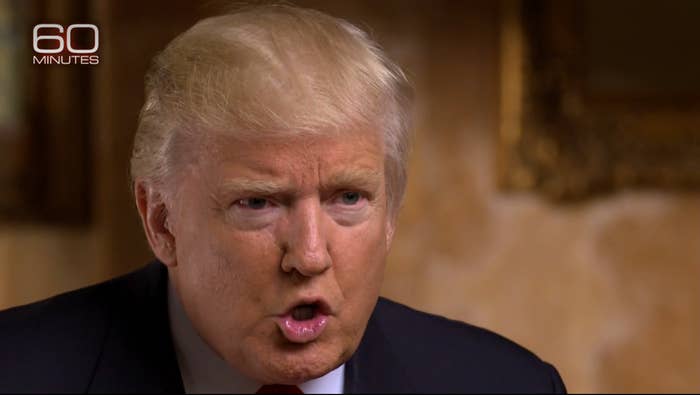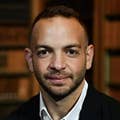
In his first extensive interview since becoming president-elect, Donald Trump told CBS's 60 Minutes he plans to deport some 2–3 million undocumented immigrants, follow through with his promise to build the border wall with Mexico, and consider appointing a special prosecutor to investigate Hillary Clinton.
Trump's remarks, to journalist Leslie Stahl, came less than a week after his shock election, the result of which was so startling he implied it left even him speechless.
Trump also seemingly dismissed the fears Muslims, black people, and LGBT people have about his candidacy based on his campaign rhetoric. He also said he was "fine" with the Supreme Court's marriage equality ruling and that he would appoint justices who were strictly "pro-life."
"For certain areas I would use a fence."
The meat of the policy discussion in the interview focused on immigration. Trump committed to build the wall he promised throughout the campaign — though he allowed that part of the wall may be a fence. "For certain areas I would use a fence, but certain areas, a wall is more appropriate," Trump told 60 Minutes. "I'm very good at this, it's called construction."
Trump said he planned to deport 2–3 million undocumented immigrants right away. "What we are going to do is get the people that are criminal and have criminal records, gang members, drug dealers, we have a lot of these people, probably 2 million, it could be even 3 million, we are getting them out of our country or we are going to incarcerate," Trump said on CBS. After that, he said, he'd make a "determination" with immigration officials about what to do with those who remain, who he referred to as "terrific people."
Trump also reaffirmed his dedication to Twitter, referring to it as a “great form of communication.” He apparently counts his followers so closely he was able to tell 60 Minutes he had added 100,000 followers the day before. "I'm not saying I love it, but it does get the word out,” Trump said of the platform. "I'm going to do very restrained, if I use it at all, I'm going to do very restrained."
Trump has relied on lobbyists for his transition after promising on the campaign trail to “drain the swamp” in Washington. Asked about this, he said “they know the system right now, but we're going to phase that out.” He repeated his pledge to push for term limits, presumably on Congress, and restrictions on foreign money, though he didn’t specify what type of restrictions.
Trump also complimented President Obama, a departure from his years of harsh criticism and spearheading the conspiracy theory that Obama was not born in the US. “I found him to be terrific,” Trump said, adding they were "talking about pretty tough subjects" such as "Middle East, North Korea, Obamacare."
Trump expressed some dismay about the disparaging campaign season — at one debate he called Hillary Clinton a "nasty woman" — but stopped at expressing regret. “I wish it were softer, I wish it were nicer, I wish maybe even it was more on policy, or whatever you want to say,” he said. “But, but I will say that, it really is something that I'm very proud of. I mean, it was a tremendous campaign.”
Asked about the Supreme Court and abortion, Trump said women "perhaps have to go, they'll have to go to another state."
Trump will come into office with one Supreme Court vacancy to fill, and he could have more over the course of his four-year term. Asked if he would appoint justices who oppose abortion rights and would want to overturn Roe v. Wade, Trump said "the judges will be pro-life.” The overturn of the case would mean states could ban abortion. When pressed on this, Trump said, “Yeah, well, they’ll perhaps have to go, they'll have to go to another state."
"And that's okay?" Stahl asked.
"We'll see what happens," Trump said. "It's got a long way to go, just so you understand. That has a long, long way to go."
And when asked if Trump supported marriage equality, he said, "It's done. It — you have — these cases have gone to the Supreme Court. They've been settled. And I'm, I'm fine with that."
Trump also seemed to dismiss fears among Muslims and black people concerning his presidency based on his racially charged campaign rhetoric and a series of racist incidents nationwide after his election, some in his name.
"I think it's horrible if that's happening," he said. "I think it's built up by the press because, frankly, they'll take every single little incident that they can find in this country, which could've been there before, if I weren't even around doing this, and they'll make into an event because that's the way the press is."
On the campaign trail, Trump promised to appoint a special prosecutor to look into Hillary Clinton’s use of a private email server. Asked if he planned to follow through, Trump said, “I'll tell you what I'm going to do, I'm going to think about it.”
He also said he'll forego the president's $400,000 yearly salary. "I think I have to by law take $1, so I'll take $1 a year," he said. "I'm not going to take the salary. I'm not taking it."
Read the full interview transcript here.
